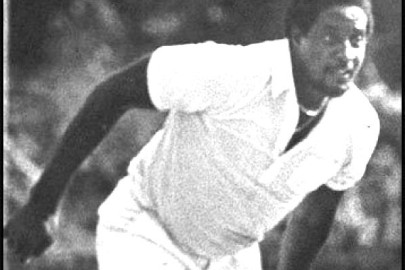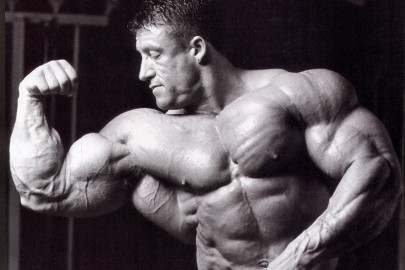Mark Cosgrove (pictured above) has the talent to be a great Australian cricketer, but he can’t get in the side because he refuses to lose weight. But are we missing the upsides of being a fat sportsman, asks Jon Hotten…
One of the marks of cricket’s ineffable genius is its scale. The distance of 22 yards, the size of bat and ball, are somehow perfect; they have survived for almost the whole history of the game and they allow a bowler the size of Steve Finn (6 ft 7in) to compete against a batsman the size of Sachin Tendulkar (5 ft 5 in) on equal terms. Unlike golf, where courses have been lengthened, or tennis, where the balls have been made slower, or team sports that have resulted in generally homogenised physiques, it is unaltered since W G Grace’s day – and Grace of course was a giant of a man by Victorian measures.
Cricket has a grand tradition of girth. Some of the greats have been well upholstered and none the worse for it. Men of appetite are attracted to it, and not just because there are two square meals on offer during the day’s endeavours.
All things change, and the post T20 era offers little mercy to the less than perfect, almost entirely because of requirements in the field (ah fielding, that dreary pursuit, that necessary penance…). More than that, there is a vaguely fascistic undertone that a ‘fat’ player is lazy, is less motivated, more blase than his team-mates, uncommitted to the endless round of bleep tests, BMI measurements and broiled chicken.
Mark Cosgrove (above) has begun the Aussie season with runs, enough of them to encourage the odd long-shot twitter punt that he might have been under the eye of selectors who currently have David Warner, Ed Cowan and Shane ‘two hundreds’ Watson as their top three – a not entirely convincing confection. Cosgrove was a non-starter, unless he put Bradman-style numbers on the board, yet his talent is undeniable and extravagantly expressed. With the frizz of hair and flash of teeth, he’s a fat, left-handed Barry Richards, not quite in Bad Baz’s class (who is?) but surely of his type.
The general view of Cosgrove is one of waste. A prodigy, he made a first-class debut at 18, was the Bradman Young Cricketer Of The Year, a player of innings so unequivocal and shot-packed they outshone illustrious champions. Then three ODIs in 2006, then the slide, the promise turned sour, the move from South Australia to Tasmania, some time at Glamorgan while others edged past him, and all the while the whisper that all would be different if he’d only, you know… lose some weight.
Yet what’s fascinating about Cosgrove, what drives at some of the deeper psychology of the game, is why he didn’t, why he won’t. What are the upsides of being fat*? Well, none that relate to fatness per se, but plenty that come with the comfort of being yourself.
The golfer Colin Montgomerie once said that his rapid weight loss had negatively affected his swing, and anyone who has seen that swing up close would know that it was a thing of beauty even if Monty wasn’t. Like the golf swing, the physical act of batting is governed by repeatable muscle memory and fine motor skills, and it doesn’t always pay to mess with them when they’ve been happening a particular way for a lifetime.
The mental act of batting has even more complexity. Within the context of teams sports, it is one of the great expressions of individuality. All batsmen ultimately do what they do alone. The inner life is key, and crucial to that expression. In choosing not to join the club and shed the pounds, a player like Mark Cosgrove may not be lazy or unmotivated; in fact it’s almost trite to think that he is.
More likely is that Cosgrove has a contrary streak a mile wide, as many great batsmen have. It can be a crucial part of the psychic armoury, and it’s the same mentality that made players like Barry Richards, King Viv, and Ian Botham walk their own path, choose their own battles. It comes from the id, not the ego, and can express itself in many ways. It can’t always be reasoned with, but its value cannot be weighed against a few pounds of body fat, either. In a perverse way, it’s about personal pride and being true to yourself, and the mental equilibrium that brings.
Cricket in the new age is on a constant search for the smallest advantage. Poor fielding has been its major battleground, and it has had its casualties. Carrying timber has been seen as a weakness rather than a difference. In the case of Cosgrove, rather like that of Samit Patel, maybe the scale should tip back the other way. After all, England aren’t worrying so much about his waistline while Samit’s showing the super-fit how to play spin bowling on sub-continental wickets…
Ultimately, skill in batting has nothing to do with size, as everyone from Grace to Inzamam and Sehwag have shown. It’s about the mental as well as the physical, about what is on the inside as well as the out. There may be many reasons to discount Mark Cosgrove, but his weight ain’t one of them.
* That’s fat in sporting terms, not in Jerry Springercoming round to cut the side of your house off terms.












I think there’s conclusive proof elsewhere that in elite sport ‘fat’ has very little bearing on fitness or stamina – one has only to look at Martin Strel; that mad russian swimmer chap who swims river systems for thousands of miles and who must surely be one of the fittest men on earth, yet looks like a bloke called Terry who props up the bar at the local pub…
http://noadventure.files.wordpress.com/2010/01/martin-strel-2.jpg
international prop forwards also fall into this category of course
Quite agree, Jon. Imagine the flak he’d get in the dressing room now, if he lost 5 stone and turned himself orange like Shane Warne.
“Ian Austin, you fat sod, call yerself a cricketer? Ethel Austin was a better batsman!” Thus spoke a disgruntled Lancashire supporter as the lad with the larger than average girth made his way disconsolately back to the Old Trafford pavilion having bitten the dust for nowt. Old big mouth was immediately pounced on by those surrounding him: “Shut your gob. He may be a fat sod, but I’d sooner have him than ten bloody Athertons!” And the exchanges didn’t stop there; I was convinced a punch-up was inevitable, and all over a chubby all-rounder. Ah, but how we loved Ian. He gave it his all – batting, bowling, fielding. Would he have been a better cricketer for six months on the Atkins’ diet? The England selectors probably thought so.
Then of course there was the gloriously talented Mark Lathwell, a self-confessed lover of large portions, not for nothing was he known as Trough or Troughers – and it showed; in 1994 his 5’8” frame was carrying 13 and a half stones – at the age of 22 his England career over with only two Tests to his name. What a waste! Possibly the finest, most natural, English batting talent of his generation. I fondly remember listening to the radio as the lunchtime cricket scores were announced: “At Taunton, Somerset are 135 for no wicket, Lathwell is 92 and Trescothick 35.” The late Peter Roebuck summed it up with something along the lines of: “If Lathwell had been West Indian he would have been treasured.”
Then there was Colin Milburn, one of the fattest and finest of them all; enough said. Good luck Mark Cosgrove. Look forward to seeing you opening for Australia at Lords in 2013. Oh yes, and pigs might fly.
Then there was Colin Cowdrey…………
It has been remarked that the baseball player Cecil Fielder had a hard time catching on because he was being judged on what he looked like in his underwear. When a major league club did take a chance, he became one of the best sluggers in the league. His son, Prince Fielder, is anything but slim, yet I guess he had an easier time American football players can be very heavy, particularly the linemen, and nobody says a thing about it.
Once while carrying stuff about for a friend entered in a hundred-mile foot race, I saw a fellow plodding along about the 60 mile mark. He was a mason, I understood, I suppose with a bricklayer’s muscles, certainly with something of a gut. But he was out in front of plenty of skinny people.